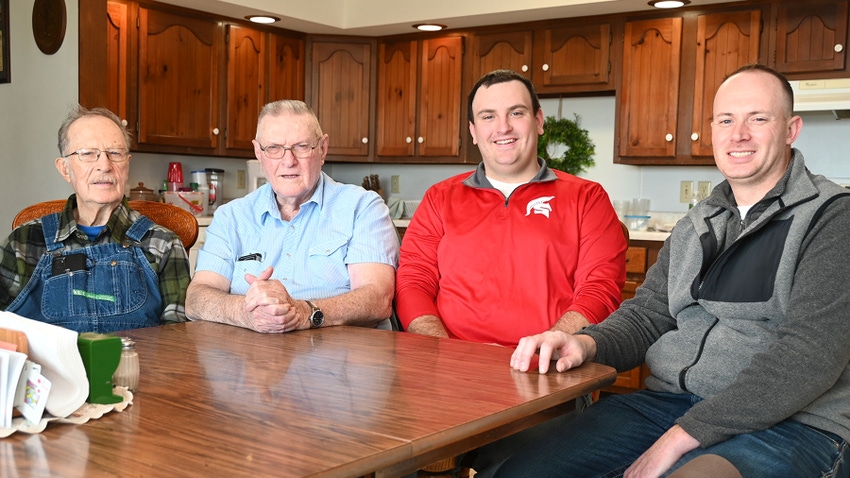
At a Glance
- Illinois farm family works with consultant to develop plan to transition from one generation to the next.
- Family developed plan to buy or lease their farm equipment to use on all the rented farms.
- They created a process to set practical value on farmland in the event of family buyouts, instead of at-auction rates.
Last fall, before taking his final harvest pass, Wyatt McGrew did something uncharacteristic. He stopped the combine, climbed down the ladder and walked over to his dad, who was watching from beside the field.
“Dad, if this is going to be your last crop, you need to pick these last 12 rows!” Wyatt told him.
I can’t imagine the emotions inside the cab of the combine as Bill McGrew harvested what was likely his last and final crop on his Walnut Grove, Ill., farm. His 61st crop, in fact! Bill is a soft-spoken man, always wearing a pair of bib overalls, with an ornery grin accompanied by some witty farm humor.
But deep inside, other emotions churn. He proved this at one of our meetings when instead of our typical parting handshake, he pulled me in for a strong embrace and some teary eyes.
Related: Succession planning featured at Farm Futures Summit
Enduring the ups and downs of a long farming career will do that to someone. He and his brother Tom began farming together 61 years ago and are now in the process of turning the reigns over to Bill’s son Wyatt and Tom’s grandson Chance. Both Bill and Tom have lost loved ones too soon, and some of their advice is just as much about life as it is about the farm.
I’ve worked with the McGrews for the past couple of years, as we’ve developed a plan for transitioning their farm from one generation to the next. It’s part of my work with my firm, Next Gen Ag Advocates, where we help farmers with family farm transition, estate planning, leasing strategies and more.
Labor and more
Family farming is a legacy Bill and Tom received from their parents and want to pass along to their kids. However, it doesn’t come easy; Bill acknowledges that it’s hard to think about quitting and watching the boys take over.
When I first met the McGrews, they were struggling with how the boys could rent or purchase additional land since all the income and cash flow from the operation was with the elder generation. That’s when farm transition conversations began.
Farming is a labor of love, and the transfer of labor is a natural place to begin many family farm transitions. Farms were much smaller in size back when Bill and Tom started farming. They were more labor intensive, and many more in number. Bill remembers he and his siblings helping each other, and none of them went home until all the work was done. Wyatt says he and his siblings loved the farm so much that the punishment Bill used to threaten them with was staying at the house.
Now they don’t need as much labor. Operating a 24-row planter with autosteer is a lot different than controlling the reigns of two workhorses pulling a two-row plow or planter. However, work ethic, grit and the desire for the farming way of life are characteristics you either have or you don’t.
Bill and Tom find comfort in knowing Wyatt and Chance possess these characteristics and are the ones to carry on their farming legacy.
Management on the farm
Bill and Tom remember doing some “wiggling around” a few times over the years, and a banker even once told them perhaps they were destined for a different career. So they know strong management is a key part of a successful partnership, and decisions related to marketing, production, leasing and equipment upgrades are all items the McGrews have discussed at their farm transition meetings.
For Wyatt and Chance, I’m not sure managing 8% on their new line of credit is much easier than Bill and Tom managing 16% interest rates during their career. As farming has become a more capital-intensive business, Bill and Tom know their successors will experience some challenges in their newly founded partnership. One thing that hasn’t changed over time is the need to manage volatility from one year to the next.
Ownership for today
They’ve developed a plan for Wyatt and Chance to buy or lease their farm equipment to use on all the rented farms.
Bill and Tom come from a large family — 11 siblings — and traditionally, many farms were divided among family members as they passed from one generation to the next. But Bill and Tom recognize they can’t afford to do this if they expect Wyatt and Chance to remain viable. So, they’ve restructured the ownership of their farms to a family partnership that will allow all the nonfarming heirs to share in ownership, too. They’ve created clear terms to keep the farms in the family, along with assurances that Wyatt and Chance will continue to operate the farms.
Land values also mean something has to give. Bill tells the story of his family once buying a small plot of land for $1 from a soldier with a sheepskin deed. Now, farms around them are bringing over $20,000 per acre on the auction block. So, they’ve established their own process to value the farms for their “practical value” in the event there are buyouts between family members in the future. This process won’t be as susceptible to external factors and to what comparable farms in the neighborhood bring at public venues.
Leadership for the future
As the patriarchs of their families, Bill and Tom have not only communicated their succession plans, but have also begun to transfer ownership and leadership roles. This will further support a smooth transition, while the patriarchs are still here to weigh in from time to time. It will also create opportunities for the next generation to get more involved and experience what it’s like to work together.
In my experience, successful partnerships have certain things in common. Partners need to work well together, put in the work, and make good management decisions. They need to communicate well, and understand roles and responsibilities. And finally, they need to agree on a process for valuing equity in the business, and on an exit strategy if, heaven forbid, something doesn’t go as planned.
As for Bill and Tom, they will continue to be more than curious observers, and I know they’ll glow with a sense of pride as they see their farming legacy carry forward another generation.
Downey has been helping farmers and landowners for the last 23 years with their family farm transition, estate planning, leasing strategies and general farm advising. He is the co-owner of Next Gen Ag Advocates and an associate of Farm Financial Strategies. Email him at [email protected].
About the Author(s)
You May Also Like






